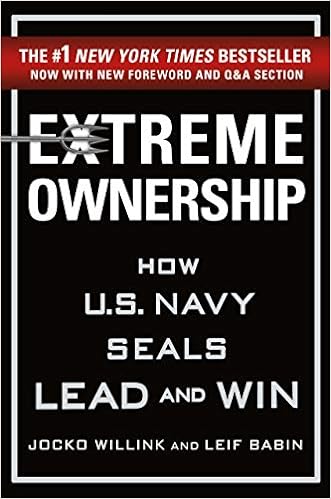I think it is well known that the supply chain area becomes somewhat of a hub for the corporation. Just about every activity either flows into or flows out of the supply chain area. Great ideas turn into products through the supply chain; Great sales of products cause great products to flow out of the supply chain and into the customer's hands. Through the S&OP (Sales and operations planning) process, just about all planning activities move through the supply chain.
This is why Extreme Ownership is so critical for the supply chain manager. There is a saying in the safety world: "You see it, you own it" and that is true for the supply chain manager. You see the issue, you own the issue and since you are going to see just about all the issues you have to take ownership to get those issues solved. Product defects? You will see it in inflated returns - You see it, you own it! Inventory problems (Too little, not enough) the distribution center manager will see that in his/her distribution center - You see it, you own it!
These ideas are built from a fantastic book called: "Extreme Ownership: How US Navy Seals LEAD and WIN by Jocko Willink and Leif Babin. This book is written for all leaders but especially for the supply chain leader. We see it all and therefore we have to own it.
While there are many types of leaders I think one large macro category could be that there are two types: Victim and Owner. The victim is the one who lists off all the things that have happened to him or her and therefore that is whey they cannot get their job done. If only forecasts were better!! If only we made products which cubed better... If only.... .Well, you get the picture. This person sits back and plays the "if only" game as a complainer, not a participant.
The Owner (in the way of Extreme Ownership) sees the issues and regardless of origin takes ownership. Rather than play the "if only" game as a spectator the Extreme Owner takes action to solve the issue(s). If only forecasts were better! - Action: I am going to meet with the head of planning to discuss how I can give an early warning indicator to things which are not selling (Planning is in supply chain but the early warning indicator may come from outside the planning department). If only products cubed better! - Action: I am going to participate further upstream in product development to educate others on the costs of not cubing properly and how we may be able to meet all the customer needs and ensure a cost efficient way to cube transportation conveyances (Design for Logistics).
My advice here is to take ownership and move out of of your "sphere of influence" and into your "sphere of concern" (Covey). Take action, own the issue and work with your other partners across the company to bring to a resolution.
After reading this book and contemplating for over 1 year (Read it last year), I really have concluded this separates out the great from the good. The great take extreme ownership, the others observe and say "If only...".

